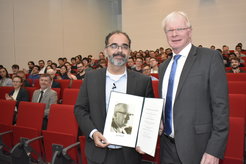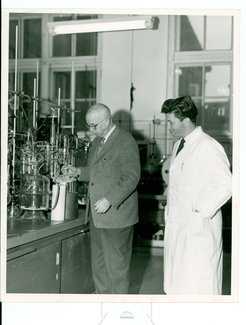Berkeley Professor honoured as Karl Ziegler Visiting Professor at the Kohlenforschung
Festive lecture with exciting catalysis concepts by F. Dean Toste and brand-new insights into Karl Ziegler's political mindset in his early career
Even 50 years after his death, the memory of exceptional scientist Karl Ziegler, director at the Max-Planck-Institut für Kohlenforschung from 1948 to 1969, is still vivid. One reason for this is the Karl Ziegler Guest Professorship that the institute organizes regularly in memory of him and his merits as inventor of the Ziegler catalysts and pioneer of polymer chemistry. This year, renowned chemist F. Dean Toste of UC Berkeley visited Mülheim and discussed his catalysis concepts with the researchers.

Which strategic approach in catalyst research makes more sense: Is it better to design specific catalysts to efficiently create a single target compound, or should we rather prefer flexible catalysts that can convert as many different substrates as possible?
This was one of the questions that this years‘ Karl Ziegler Visiting Professor F. Dean Toste from University of California, Berkeley discussed with the Mülheim scientists. His conclusion: Whichever approach you take – above all, it makes a lot of sense to investigate and develop catalysts in the first place, because they are one of the most important tools for chemical processes.
In his keynote lecture, Toste spoke about his latest research results in the field of supramolecular catalysis. Here, chemists attempt to mimic the complex active site of enzymes and thus produce active ingredients, following nature’s example. Dean Toste raised the question of whether the "lock-and-key" principle of catalysis must always apply, or if a catalyst could be significantly more flexible than a lock. "Maybe a catalyst is more like an orange net, into which you can pack many different things, and which can adapt to its contents in terms of shape," Toste said.
The Max-Planck-Institut für Kohlenforschung had invited the professor from California as Karl Ziegler Lecturer 2023 to honor him for his outstanding contributions to homogeneous catalysis and exspecially for the development and understanding of molecular gold catalysis.
Ferdi Schüth introduced exciting news about the person Karl Ziegler
In his introduction, Ferdi Schüth, managing director at the Max-Planck-Institut für Kohlenforschung, had a close look at Karl Ziegler who had headed the institute extremely successfully from 1943 to 1969. "Were the political circumstances in the Nazi regime the reason why Karl Ziegler came to Mülheim?" This question had been investigated by the head of the Historical Archive of the Kohlenforschung, Christoph Kießling. He had found revealing historical evidence, which Schüth now presented to the guests. "If we look at Karl Ziegler's scientific career in the 1930s and 1940s, it is striking that he should have become a professor earlier. The historical sources prove that Ziegler was not appointed to several professor positions because of his distanced attitude to the NSDAP. The decision-makers wanted to keep him in Germany because of his exceptional talent, though, but he was not supposed to have influence on students," said Schüth, showing original notes and letters from the personnel files of a German university and authorities. "Because of his convictions, Ziegler was "whisked away" by political decision-makers to Mülheim to what was then the first scientific institute in the Ruhr region. Luckily, that way we got an exceptional scientist with a great ability to manage the economic fortunes of the institute," Schüth said.

The 33rd Karl Ziegler Guest Professorship - three days of exchange at a high level
Dean Toste's visit included three lectures and many opportunities to exchange ideas in personal conversations or at a barbecue with the students on campus. The public lecture was a highlight that also attracted experts from surrounding universities to Mülheim. Quite a few of the 33 chemists who have been honored with the Karl Ziegler Visiting Professorship were awarded the Nobel Prize in Chemistry later. The list reads like a who's who of chemistry.
The Karl Ziegler Visiting Professorship was established by Karl Zieglers‘ wife and daughter after his death in 1978. A separate foundation provides funds to enable scientists from all over the world to hold guest lectures at Ziegler's place of work. It is endowed with 5.000 Euro.
Karl Ziegler earned the Nobel Prize in Chemistry together with Giulio Natta in 1963 for the development of the Ziegler-Natta catalysts. The new class of catalysts was of outstanding importance for the polymerization of ethylene and thus for the industrial production of plastics.













